His name was Clover Sturlin and for years, I thought he was the ugliest man I’d ever seen. When I first laid eyes on Clover, he was standing in the middle of the street, at the intersection of Broadway and Cache Streets in Jackson, Wyoming. I was a teenager from Kentucky on a family vacation, and though I was short for my age, I felt like I’d tower over him if we stood back to back. A droopy gray mustache at least concealed part of his face, which was a blessing, but it was his eyes that really set me back. Or I should say “eye.” Sturlin’s left eye was missing and it looked as if someone had taken a sledge hammer to that side of his face. Though eye patches were available in those days, Clover chose to proudly display his blackened empty scarred socket like a badge of honor. The fact that he was known as “Clover the Killer” didn’t help matters.
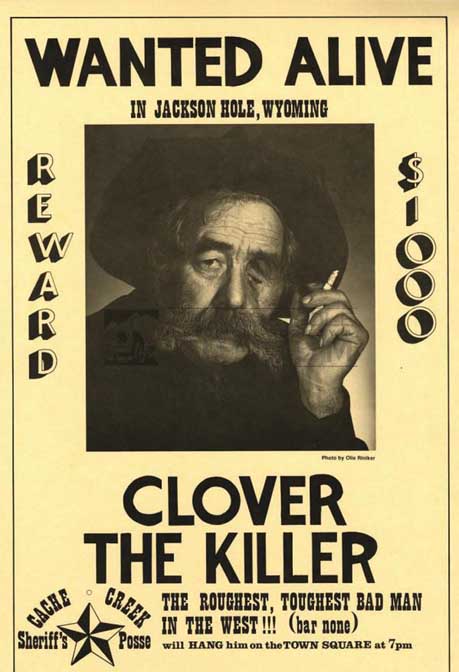
Years later, I discovered an out-of-print book, published in the early 50s, a wonderful remembrance called “The Cocktail Hour in Jackson Hole,” by Donald Hough. (In those days, the ‘cocktail hour’ lasted for months in this isolated part of Wyoming.) In his very young days, Clover was a celebrated rodeo rider. When, as Clover remarked, “the saddle got too small” for him, he transitioned to rodeo clown. He was one of the best. But his wife worried for his safety and urged him to give up the rodeo completely. Reluctantly, Sturlin turned in his spurs and his chaps and took a job in a nearby saw mill. On his first work day, a splinter of wood broke loose from the saw blade and struck Clover Sturlin in the eye. It destroyed his vision and left him permanently impaired. So much for a safer workplace.
In 1924, he and his wife came over Teton Pass in a Model T and made Jackson their home; for years, Clover made a living selling firewood and coal to his neighbors. They got by, like everyone else, on whatever way they needed to do, to stay in the valley
But now, in the summer of 1967, Clover Sturlin was a wanted man. “Clover…the Killer…is my name, “ he’d declare. “That, I cannot deny.”
In fact he declared himself every summer night at 7 PM, from Memorial Day until Labor Day. Clover Sturlin, a man once as rural and homespun as one could hope to find, was now one of Jackson’s biggest tourist attractions. Every evening, the sheriff prepared to string ol’ Clover up from the local parks’ famous elkhorn arches, and every night, he convinced his captors to shoot it out with him. He died promptly and repeatedly at 7:15.
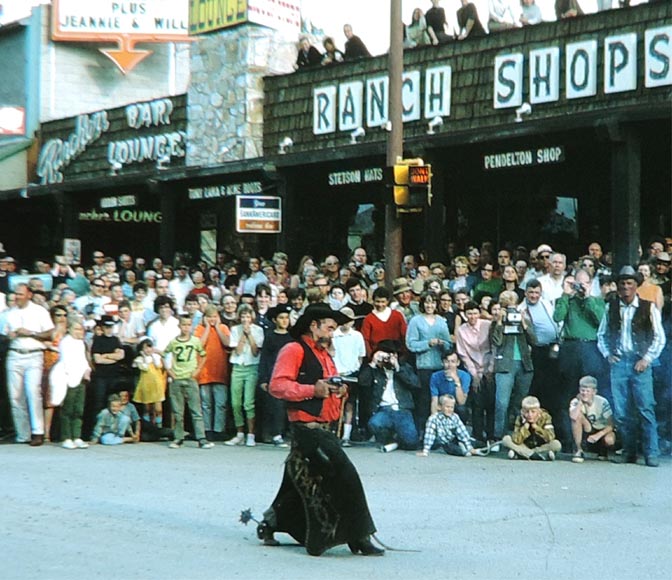
Broadway & Cache Streets…every night at 7 PM.
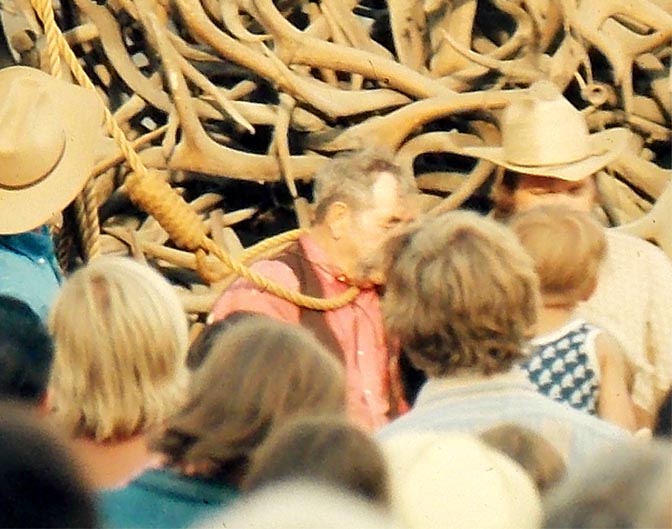
Before the war, very few had heard of the little hamlet or the valley, Jackson Hole, that lay north of town, in the shadow of the Grand Teton mountains. But after almost 20 years of economic hardship and World War II, the post-war boom also brought tourists by the thousands. The local Chamber of Commerce came up with the nightly “shoot-out” concept, and from the beginning, it was a huge success, at least for the local merchants in the tourist trade. But the rest of the mostly working class population of Jackson loathed it. They even started badmouthing ol’ Clover. Before stardom came to Sturlin, he was well-liked and the only complaint ever expressed about him was the question of whether he was shorting his firewood customers (He wasn’t. The complainers usually discovered that the last cord of delivered firewood was buried under the winter snow). But now some of his fellow Jacksonites were calling him a “big phony.” It was a lie— Clover Sturlin was the ‘real thing.’ But who could resist a shootout every night? In fact much of the town felt the same way about the whole gimmicky commercialized “Last of the Old West” marketing scheme. The problem was, the scheme worked.
The “tourist section” of Jackson in the late 60s was really no more than the city park with its elk horn antler arches, and the tourist related businesses that surrounded it. There weren’t even that many motels in Jackson back then. But times were changing. Clover “The Killer” Sturlin, former rodeo cowboy, clown and woodcutter. turned street performer, unwittingly represented in many ways the bridge between the isolated, poor, but very contented Jackson Hole that he and his neighbors had loved for so long, and the future “New Jackson ” that ominously awaited them. It was a future that was much closer, and much worse, than any of them realized.
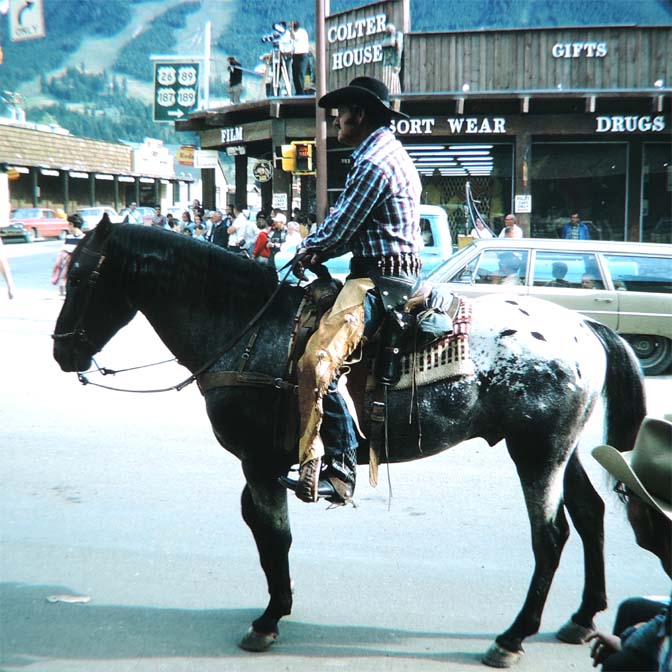
*****
Still, not knowing any better, I fell in love with the Jackson Hole country from the moment my family first visited the area in 1967. By then, tourism was already a significant part of the Teton County economy. But it was a short season. Before the bigger and better and more trendy ski resorts like Teton Village were developed, only Snow King Mountain, a relatively modest ski slope just east of the town center, offered winter sports. The winters stayed long in northwest Wyoming and it could still snow in late May. Early blizzards were known to shut down the passes again by late August. Its tourist season was a mere 90 days. Even the most annoyed locals could tolerate the tourists for three months. Everyone looked at tourism as a way to augment their incomes, not replace them.
As soon as I was able to break the clutches of parental control, I started making trips to Jackson Hole on my own. I even made a brutal and scary journey to northwest Wyoming in late December. (read about that trip here) The nightly low temperature when I arrived had been -37 F. I got a room at the Four Winds Motel for eight bucks a night and the next morning, made my way to the Chateau Cafe for breakfast. Nancy, a waitress from the previous summer, remembered me. I had told her I’d be back but when she saw me walk through the door, with my beard and nostrils frozen solid, she laughed and said, “Boy, you have to be crazy to love Jackson this much…you need coffee.” I told her I wanted to make Jackson my home and planned to be back in May to look for a job. She smiled and said, “I might be able to help you out. Come see me when you get back.”
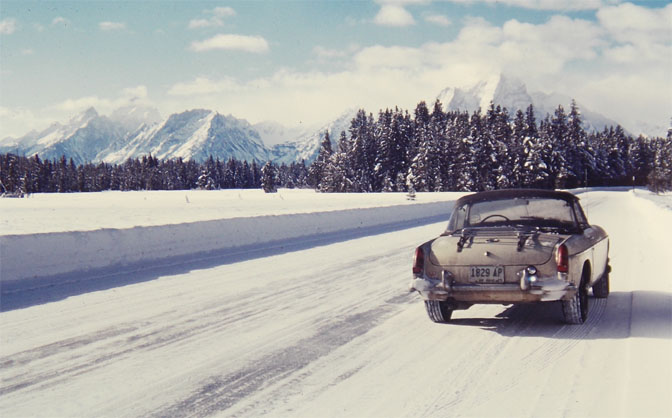
True to my word, I limped back to Jackson in my MGB, and just south of Hoback JUnction, the entire exhaust system fell off my car. I lashed it to the truck and kept going. Jackson Hole or Bust. I first showed my face when I finally arrived in town at the Chateau. It was late May, and there was still snow on the ground in places. Nancy was still there too. Again she gave me a hug and asked me if I still wanted a job. Nancy scribbled a name and an address on a scrap of paper and advised me to pay him a visit.
“Walt Shinkle,” it said. “Harold’s Standard.” Who’s this? I asked. Nancy said, “That’s Walt. He’s my husband and the mechanic down there. Tell him I sent you.”
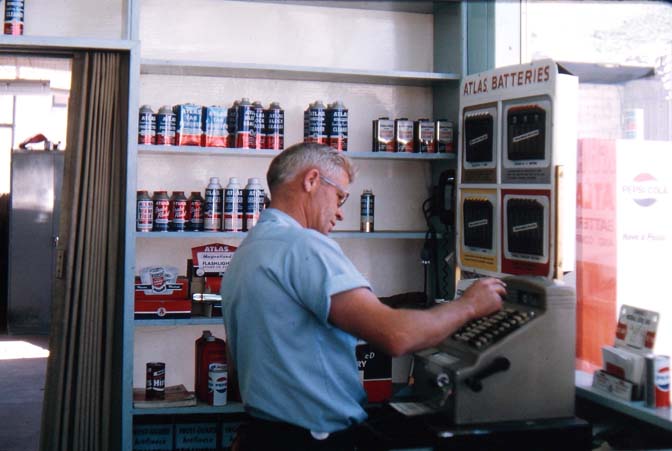
Patriarch of the Shinkle Family
I found Walt a few blocks south and introduced myself. Walt was quiet and kind and good at his job. He was a soft-spoken, laid back Jacksonite with a long and deep connection to the area. Decades later, his son Jack would offer me a bit of his family’s pioneer history….
“William Cornelius Shinkle came to the Valley in 1902. He Homesteaded in the upper Gros Ventre. He was appointed the first Postmaster for the Brooks Post Office that was in the vicinity of the Lafferty Ranch. They later relocated to Kelly so the Kids could go to School. I don’t know much about what he did for a living other than he at one time he worked as a Mason and was on the Crew that built the Old Faithful Lodge in Yellowstone. In those times people in Jackson Hole did whatever they could do to make a living. Teamsters, Carpenters, and Ranch Hands. None of my Family ever Proved up on their Homesteads.
“My Grandparents had 15 Kids. All of the Guys were involved in Ranching at some point or another as Ranch hands, only one of them made it a Career..”
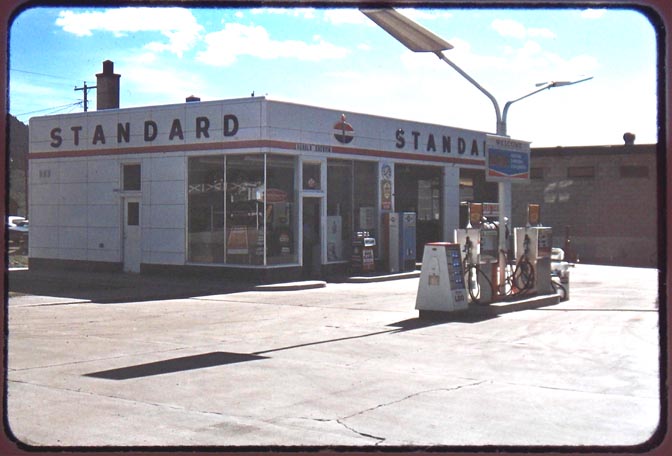
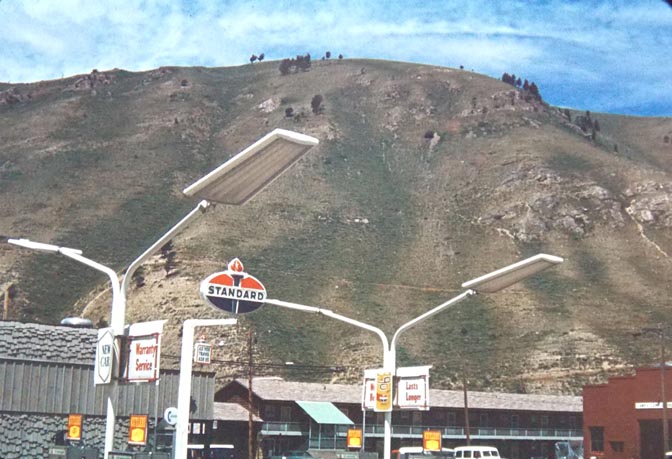
Walt was ready to hire me, but he wasn’t the boss; he introduced me to the station owner, Harold Shervin. Harold said if the Shinkles liked me, I was probably okay, but he still had his doubts. Harold rubbed his chin and said, “But Jim…you gotta do something about that hippie hair. You need a haircut.” In my defense, my hair just wasn’t that long. It was a “Meet the Beatles ‘64” style and nowhere near “White Album” hairy excesses. Still he wanted that haircut and even sent me to a specific barber. I needed the job, so I grudgingly agreed. The barber gave me a decent clip, I returned to the station and Harold said, “Golly Jim…I thought you woulda got that haircut by now.”
“What?” I exclaimed. “He just butchered me!”
Harold chuckled. “Well, son, this is just not gonna do. Tell you what…you go back there and I’ll pay for a second cut.” When I returned an hour later, I almost felt naked. But Harold could not have been happier. He slapped me on the back and told me I was hired. “You look like an American now, Jim.”
*****
This was 1970, when there was a huge culture divide in America, not seen since…until now. But it was “Hippie Summer” in Jackson that year and the clash between the newcomers and the locals got pretty intense. Even Walt’s five boys called me “Hippie Jim,” though without any hint of malice. The boys stopped by regularly to see their dad and I often got to kid around with them too. But we all liked each other, regardless of hair length. That wasn’t always the case. There were numerous skirmishes between the “hard hats & the hippies,” and sometimes it got a tad ugly.
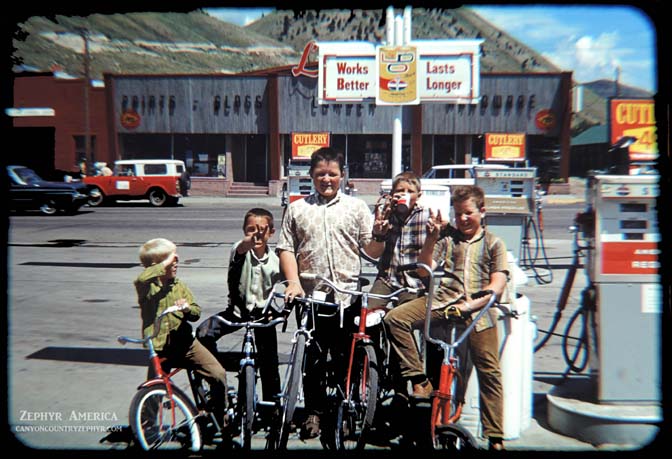
I’m sure they envied my Beatles look!
I worked the noon to 10 PM shift at Harold’s and Most of the locals waited until evening to gas up. During the day, the tourists were regular customers who also complained bitterly about the price of gas— 44.9 cents a gallon and believe it or not, that was one of the highest gas prices in the country. Still I always preferred the evening business when the ranchers and other working men stopped by. One local was a particular favorite. His name was Tom Fortune. He was about 6 feet tall and might have weighed 130 pounds after a hard rain. His waist could not have been more than 28 inches. Tom had an agreement with Harold that he could use the bays after hours and he was a frequent visitor. Like so many ranchers, he got by on a wing and a prayer and baling wire. He had more patches than rubber on much of his farm equipment and still owned a lot of tires with split rims, which are a real pain to change. But Tom was not one to give up on a wheel or a piece of machinery if he could jury-rig it and keep it alive for a bit longer.
Tom was a man who never complained and never bragged. In fact, he just didn’t like to waste time on unnecessary conversation. One evening he came in with another flat and as he climbed out of his old truck, he was clearly injured and in pain. Tom Fortune might have only been in his late 30s but he was moving like a man twice that. I was concerned…
“Are you okay, Tom? I asked.
Long pause. Finally, “Yeah.”
“You look like you’re hurting pretty bad.” Tom shrugged.
I should have just left him alone but I pressed him a bit more. “What happened?”
He stared at me for a few seconds, put his cigarette back in his mouth, returned to breaking the split rim on his latest flat and said, without looking up, “Steer kicked me.”
I decided to leave him to his work and started hosing down the lot as I did every night. Finally I saw him throw the tire into the bed of his old pickup and hobble back to the cab. Ashe struggled to pull himself behind the wheel, I yelled out, “Hope you feel better Tom.” He finally smiled and said, “No big deal…it’s a long way from my heart.”
I hope Tom lived to a ripe old age. He deserved it. And he never complained about my hair.
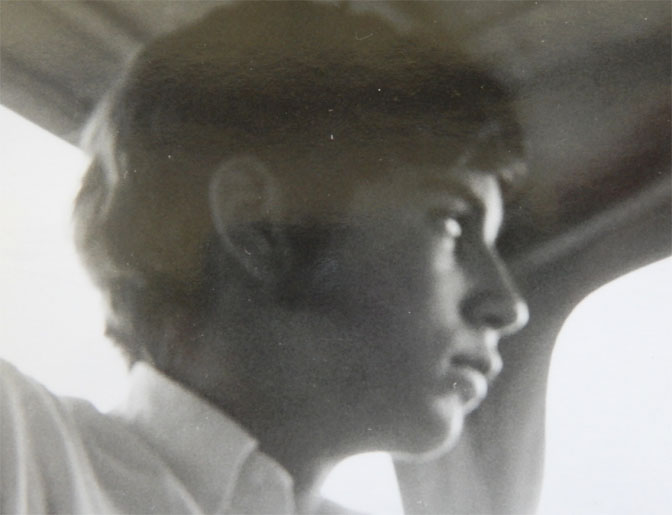
*****
In 1970, convenience store/self-serve gas stations didn’t exist. All “filling stations” as they were called then, were full service. Until 25 years ago, one of the most familiar sounds in America was the sound that a vehicle made when it ran over what looked like a small black rubber hose. The hose stretched across the station entrance and the pressure on the hose caused a bell to “ding,” alerting the staff that a customer had just pulled in. We really did go to the car window, the driver would say “Fill ‘er up, regular.” I’d ask if he wanted me to check the oil and I automatically cleaned the windshield. I still remember my first customers; they were an elderly couple, obviously Jackson Natives, and highly regarded by the community. I cleaned the windows—we used a squeegee and a spray bottle of soapy water then, and I thought I had done a bang-up job. But I saw the frown on the customer’s face and he called over to my boss, Harold trotted right over and asked if there was a problem.
“Look at that, Harold,” the old fellow said. “Look at all those streaks he left. Surely this boy can do better than that.”
Harold poked his head inside for a better angle and nodded. “Yep, Jim….if you’re working here, you better learn to take more pride in your work. Do it again.”
I gave it a second shot and this time both of them were satisfied. The old man smiled and said, “You’ll learn…you’ll learn.” They became friendly acquaintances for the rest of the summer and sometimes praised my window cleaning beyond what I even deserved.
But while I’ve noted that convenience stores didn’t exist in 1970, these gas stations needed other ways to turn a profit. And much of it came from the sale of tires and shock absorbers. Without healthy sales numbers for these higher ticket items, most stations couldn’t survive. And this is where the business got a little sketchy. Across the country, but especially in the West, where Easteren-born and raised tourists had an innate fear of being stranded in the middle of nowhere, many stations hired salesmen for the sole purpose of selling tires and shocks. These guys were called “50 percenters.” The deal was, they worked on zero salary but got to keep 50% of everything they sold. I was never sure if that was 50% of the sale or the profit. But needless to say, they did well.
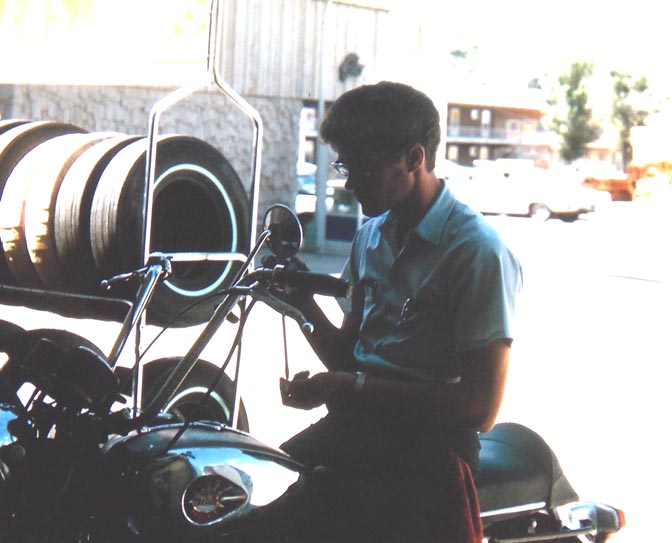
At Harold’s, the 50%er was an amiable young guy named Terry Pascoe. He was slicker than snot on a glass door knob, a fast-talker, and he fancied himself a ladies’ man to boot. From what I could observe, he was.. He still wore his hair ‘Elvis-style,’ in a pompadour. Often as I filled the tank and got the windshield, Terry would come over and offer to help out. He’d check the tire pressures and in more cases than I can begin to remember, he’d tell the owner, “Sir, I don’t want to alarm you but your air pressure was low in your rear tire. I filled it up, but if you want, we can put it on the lift and look for leaks.”
Seventy-five percent of the time, the owner would agree, and half the time, they’d leave with a set of new tires and $250 poorer. He was one hell of a salesman. He had a buddy, a squirrelly little guy named Willie who helped do the heavy lifting, for a percentage of the take. I knew in my gut that something wasn’t right, but I didn’t have the courage to speak up. I think with Harold, the boss, his policy with Terry was, “Don’t ask. Don’t tell.”
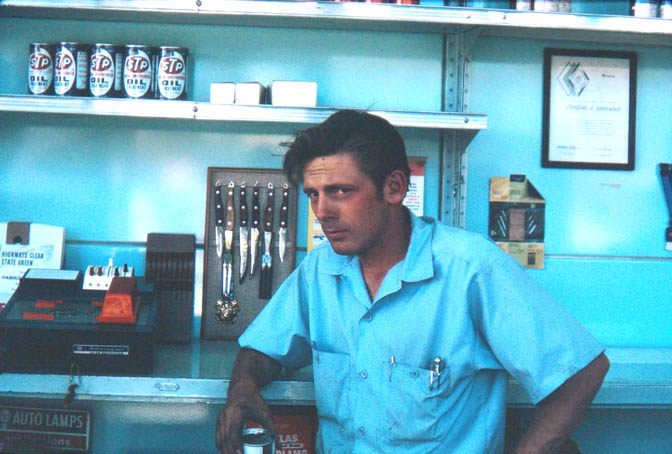
And I couldn’t deny, Terry was always nice to me, and would even slip me a buck or two for helping him out. Harold was paying me $275 a month for 10 hour/6 day weeks. But I loved being in Jackson so I really didn’t feel I was being taken advantage of. What is it they say? “Be happy in your work.” And I was. I got to meet lots of old time Jacksonites. I became friends with the Wilson family; it was the previous winter that my buddy Tynes and I had limped into Jackson, almost completely frozen in -30 temperatures and found refuge at the Four Winds Motel on Milward. The motel was owned by George and Dorothy Wilson and they rented us a room for a week, for eight dollars a night. Every morning George had to come out and jumpstart my MGB.
Five months later I was back and I stopped by the motel. They both remembered me and soon I got to know their son, whose name I cannot recall, and their daughter, Dotie, who worked at the local bank. I saw them often during that summer, and discovered that the Wilson family was one of the founders of the community —Wilson, Wyoming is just down the road. They were the best of the best.
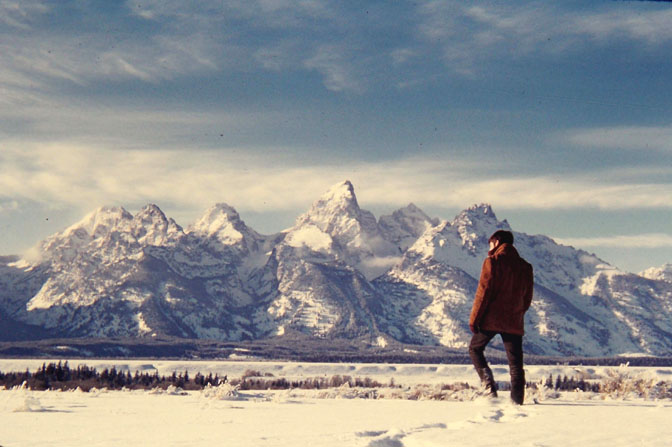
Is this a dramatic photo or what? Done with a tripod. January 1, 1970.
A few years later, I was getting my car serviced in town and the mechanic, thinking I was just a dumb tourist, overcharged me by about 300%. I called George on the station pay phone and he said, let me talk to that mechanic. I couldn’t hear what Mr Wilson was saying; I could only hear the mechanic saying, “Uh…yes sir. You’re right Mr. Wilson. Yes sir. Yes sir. I’ll make adjustments. Yes sir.”
The mechanic hung up the phone and turned to me. “Give me your invoice,” he said.He sat down at his desk and started scratching out numbers, and scribbling in new ones. When he was done, George Wilson’s phone call had shrunk my bill by 75%.
It’s good to have friends who are founders of the town.
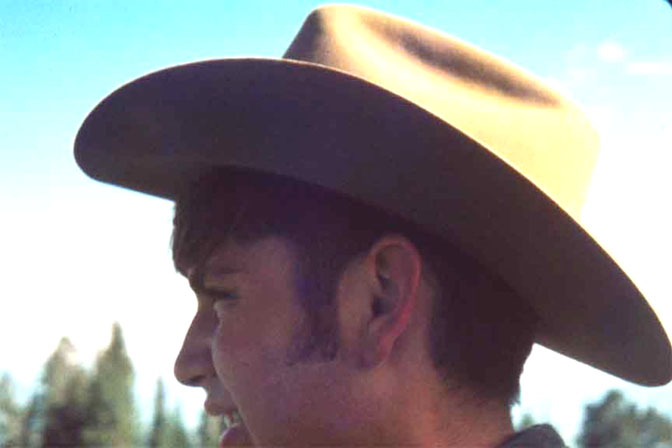
Every morning, before I came to work at noon, I’d drive up to the park and find some new back road to wander about on. I used my MGB like a jeep at times and despite the low clearance, I managed to keep my new muffler intact. Then, before I checked in at Harold’s I’d stop at a tourist trap/drive up cafe called “Bill Bailey’s Frontierland.” It served burgers and fries and tator tots. Over the summer I developed a massive crush on a girl who worked there named Nadine. But we never went out, in fact I only saw her through the order window. But at the end of the summer I gave her my address and we corresponded through the winter. How that all played out has been mentioned in other stories. (Click here)
On my last night in Jackson, before I quit my job and headed back to Kentucky, Terry showed up to say goodbye. And he had a surprise for me. He had noticed my own tires were a bit threadbare and he pulled out a set of lovely deep tread used tires that just fit my car. He had no doubt scammed them from another unsuspecting tourist, and I felt guilty, but not enough to refuse his offer. He even mounted and balanced them for me.
The next day I left Jackson and I assumed I’d never see Terry again. But in August 1973, I was on my way back to Jackson. I stopped to gas up in Rock Springs when I noticed a guy checking my tire pressure. It was Terry Pascoe. Before he could look up, I said, “I’m pretty sure my tires are just fine Terry.”
He spun around surprised, but then he grinned. He laughed and recognized me immediately. He said, “Yeah Jim…I guess you had me figured. You know me too well” We talked a bit and he told me he’d had a bit of a run in with the law, but that Life was good again. I remember that he looked the same, but different. His eyes were different—almost glazed. He had changed in three years. We shook hands, I headed for Jackson, and I never saw Terry Pascoe again.
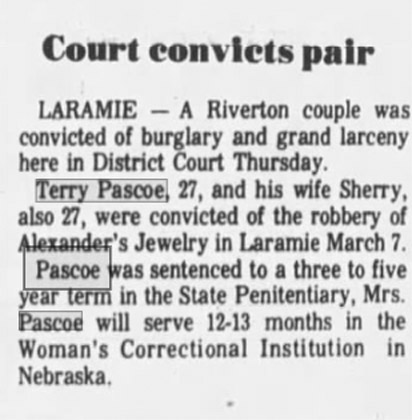
But decades later, doing some research on newspapers.com, I came across Terry’s story. He had indeed run into the law — he had been part of an armed robbery.. I can’t recall the town. Terry was sentenced to the state prison but was a model prisoner, and when I saw him, he was already part of a work release program. I thought maybe he had turned his life around. But as I continued to scan the site for stories about Terry, I discovered that he died just two years later, by his own hand. It was a shock for me, even 40 years after the fact. He was more a flim-flam man than a violent criminal and I liked him. Another life with so many possibilities that went wrong,
Local news reports from Casper.
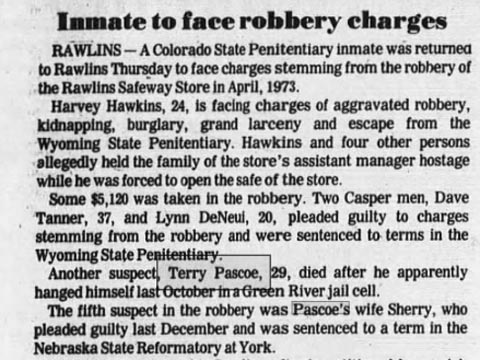
But going back to 1970, sometimes during that summer, the hippie-cowboy conflict did approach imminent violence.I One night a young cowboy stopped for gas. As I rang up his bill, he seemed to be glaring at me with an intensity that would worry any skinny short kid with hair longer than half an inch. Finally he said, “You know, if your hair was much longer, I’d have to punch you out.” Suddenly I felt a certain gratitude to Harold for his semi-forced shearings.
“Why’s that?” I said shakily.
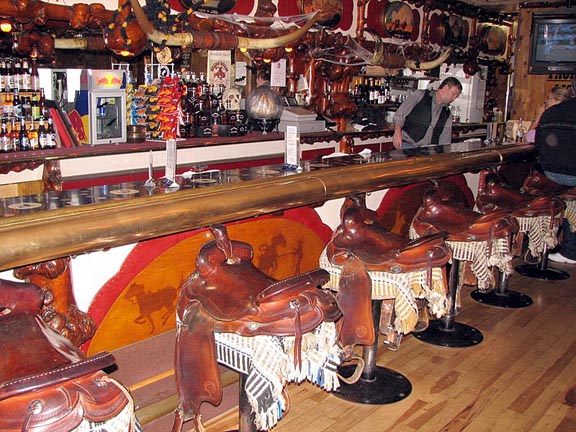
He squinted even harder. We don’t like hippies around here. Don’t like him a bit.” A week earlier, there’d been a rumble at the Cowboy Bar. Some hippies had made themselves and their politics known to the regular bar customers and it ended in a rumble.
“Did the cowboys win?” I asked.
“Son,” he replied. “We was out to win.”
But while many of the locals fretted about the hippie invasion, the real threat to their community went unnoticed. Those “damn dirty hippies” might have been an annoyance, they’d have little influence on the changes–the transmogrification of Jackson Hole — that was just around the corner.
*****
At the end of the summer, I left my job at the gas station and went back to Kentucky to finish school, but three years later, I was back. The only job I could find was as a traveling assistant janitor for the “Dust Mop Janitorial Service.” (My father said, “I’m so proud that you’re putting your college education to good use.”). We “custodian professionals” often worked through the night, cleaning the industrial kitchens of some of the more prominent restaurants in the area. My partner was a young guy from Portland, Kerry Lanier, who was the spitting image of Dick Cavett. What we saw in some of those kitchens was enough to keep me from ever wanting to “eat out” again. I’ve never seen so much grease and garbage and rotted food in my life. It was miserable work.
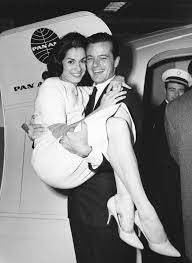
But Jackson and the valley north of it was already becoming a mecca for the wealthy. Only a smattering of homes had been built by then, but you could feel the changes. Most notably the singing star couple Robert Goulet and Carol Lawrence had built a home five miles north of town with a magnificent view of the Grand Tetons. But one could see a trend. Kerry and I cleaned four or five homes a week. All of them were situated in that vast open part of Jackson Hole south of the airport. As we drove to the first house, Kerry advised me, “You won’t believe this place.” He’d cleaned here before.
The home was not particularly impressive outside, just a very long ranch house, stylishly appointed with native stone and redwood facade, and a stunning aspen shake roof. But once Kerry turned the key and we went inside, I was speechless. The northwest side of the house was all glass, and granite and marble—the place was oriented to point directly at Grand Teton peak. Even the bathroom had its own magnificent view.
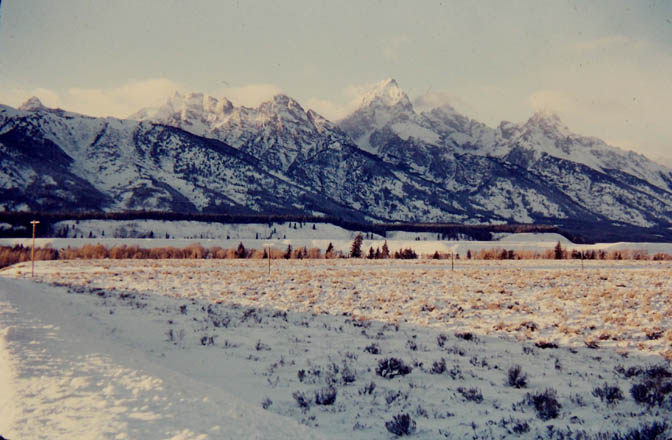
Downstairs, a high ceilinged “grotto hot tub,” with maybe 25 by 30 foot dimensions, partially filled one end of the room. It reminded me more of a quarry. Underwater lights cast strange reflections and shadows on the stone walls. A “recreation room” was available adjacent to it, for anyone who grew bored with the scenery. Clearly no one had cut corners here to save a buck.
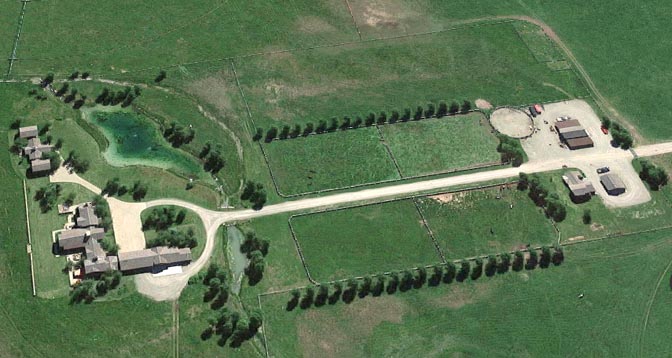
We loved these gigs. Our job was easy. Other than picking up the dead flies and giving the horizontal surfaces a light dusting, our biggest task was finding ways to consume the contents of the owner’s liquor cabinet without getting caught. I noticed that he had subtly marked the level of his favorite single malt Scotches and Wild Turkey bourbon with a pen. No hired help was going to drain his ardent spirits. But we found a bottle or two that hadn’t been booby-trapped, so we developed a taste for Drambuie.
A few nights after our cleaning, Kerry and I went to the Cowboy Bar for a beer and he pointed out a rather bland looking middle-aged man sipping bourbon at a table with a very attractive woman. “That’s the guy,” Kerry said. “…the rich dude whose house we cleaned. He must be back.” The owner was usually only there a week or so every month. He flew in on Friday nights and kept a Land Rover parked at the airport for his convenience. He tried desperately to look and act the part of a local, as if he wanted to fit right in, but he couldn’t quite make the cultural leap.
It was my first closeup brush with that kind of opulent wealth, and if I could ever find an attribute of my own that I am proud of, it’s that even then, I never found myself feeling envious of that kind of extravagance; in fact, I found it downright repulsive. I understood wanting a comfortable life. But I never understood making a show of it.
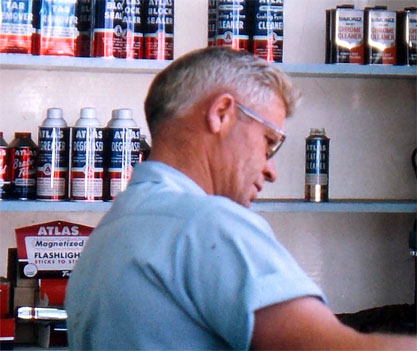
By 1973, you could stick a fork in Jackson Hole…it was done. On yet another visit, I stopped by to visit with Walt and Nancy Shinkle. Walt said he was done too. “This place is nothing now but a bunch of rich phonies and a bunch of locals who want to kiss the phonies’ ass. I’ve had enough.”
(NOTE: During my 1973 visit with the Shinkles, they also had some very sad news for me. Harold Shervin had been my boss at the station and he had two boys. Mike was 16, just a few years younger than me. Danny was 14, and also a great kid, though he was cowboy through-and-through, and like his dad, tooka dim view of my “long” hair. He loved to razz me about it though not in a mean way.
But Walt and Nancy had some tragic news. Within weeks of my departure, Mike was diagnosed with an advanced and incurable form of cancer, He died in January 1971—just five months after I said goodbye. I know a little cowboy wouldn’t want to be described like this, but Mike was as gentle and kind as any boy I’ve ever met. When I think of Mike, it still hurts…JS
Decades later, their son Jack would remember, “My Folks moved out of Jackson in the Fall of 73. We went to Twin Bridges Montana and bought a little Cafe… Very few of Dad’s Siblings stayed in Jackson because of the changes that were going on in the Valley.” None of them ever returned for anything but a sad and sentimental visit…a short one.
For folks like Walt and Nancy Shinkle, Jackson was already uninhabitable 50 years ago. Many of their friends would follow suit. South Park, a lovely pasture south of town, was consumed by subdivisions and condo developments. Jackson almost became unrecognizable except for the downtown square and the elkhorn arches.
*****
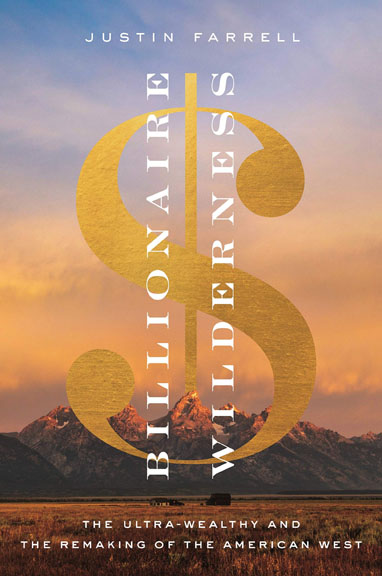
In 2020, author Justin Farrell wrote a revealing book called, “Billionaire Wilderness.” His interviews with the mega-rich and more disturbingly, with the working poor offer revelations about the place I once dreamed of calling home. The relationships between the “haves and have nots” in Teton County reflect similar situations and attitudes across the West. Years ago, I think I called it a New West Feudalism. The economy generated by the growing presence of wealth in the rural west has come to be regarded as essential to many, a necessary evil to others. Farrell notes that, “What most people don’t know is that the grandeur of its wilderness is matched by the awe-inspiring concentration of wealth and a canyon-size gap between the rich and poor there: It is both the richest county in the United States and the county with the nations’ highest level of income inequality.”
In the summer of 1970, I could rent an apartment in Jackson for a hundred bucks a month. Today the average long term rental costs more than $2500. To buy a home in Teton County, the median price is $3, 599,000. I think I’ll buy two.
Over the years, I returned to Jackson Hole again and again, for no other reason than to affirm my belief that the world is going to Hell. The optimist in me kept thinking there were limits to obscene opulence, but each visit proved me wrong. I haven’t been back in 16 years.
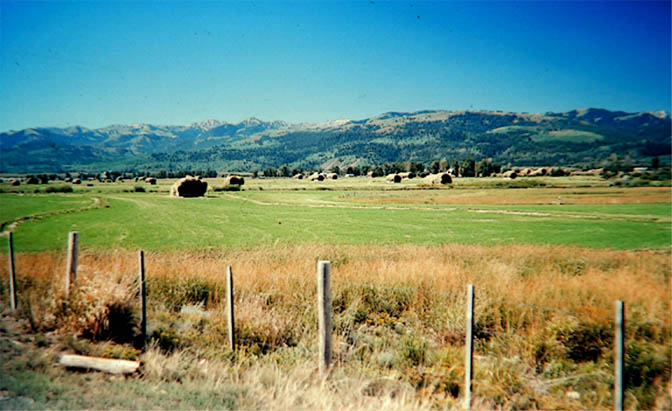
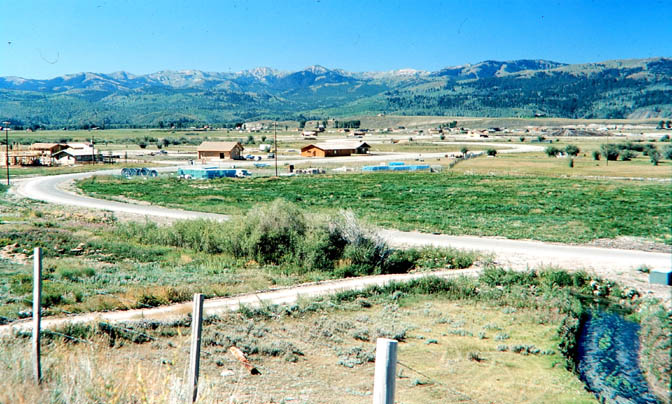
This was barely a harbinger of what was coming…
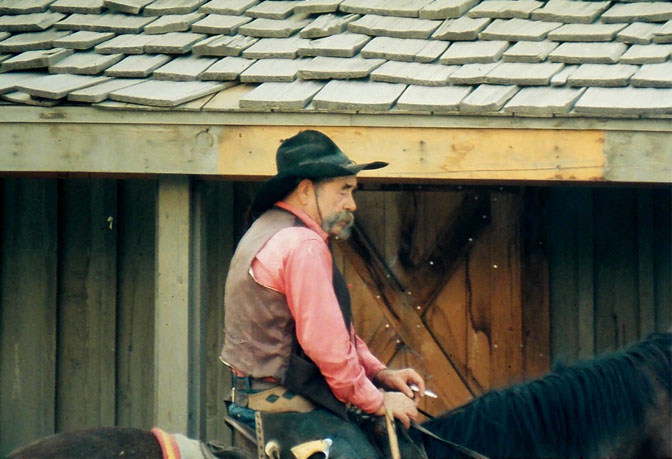
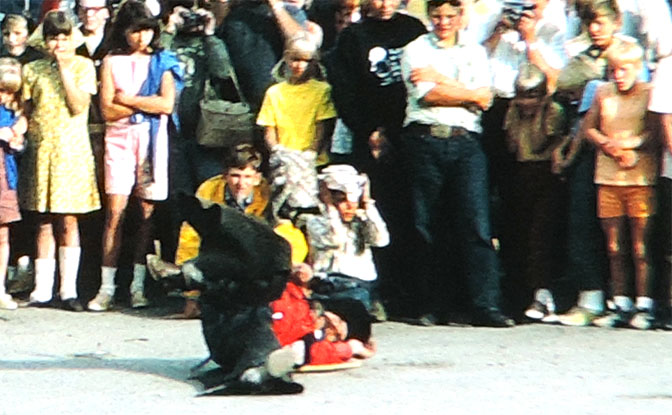
Clover Sturlin…”Clover the Killer”…after years of faithful service and brilliant acting, he was fired from his starring role. Some claimed he imbibed too many ardent spirits when he was on the clock, but his replacement could not fill Clover’s tiny little boots. The Chamber of Commerce brought him back again, then fired him again. His family maintains to this day that Clover was not a drinker and assumed he was just too independent and too cantankerous for the “New Jacksonites” that were taking over the town. I think they were probably right. The ‘New West’ had little tolerance for the Old West. What they wanted, like all “New West” towns today, is an ever increasing profit margin. There is no limit to their greed, nor is there any bottom to their ethics. Finally Clover left Jackson and died a few years later in Evanston, Wyoming. He was brought back to Teton County and was buried at the Elliott Cemetery, just off the Teton Pass Road. If Clover could see what Jackson and Jackson Hole have become, he must surely still, after all these years, be spinning in his grave.
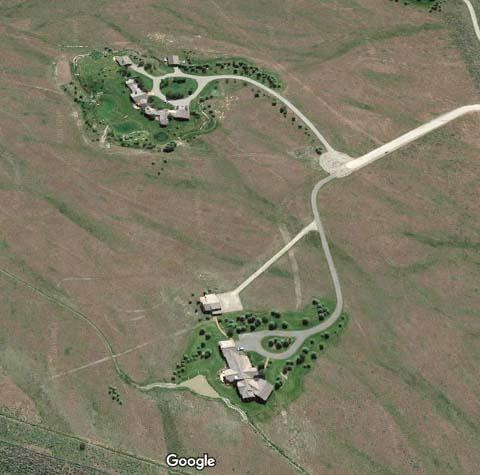
Jackson doesn’t remotely look like the town I remember from 52 years ago. Or even 16 years ago when I last visited the area. But more and more, rural communities across the “New West” are starting to imitate Jackson, in little towns you would have never thought possible, including the town I finally chose to call home. I thought such a transmogrification in Moab was impossible. How wrong I was.
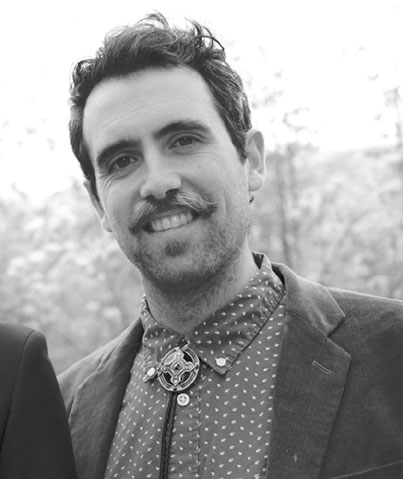
When The Zephyr posted an excerpt from Justin Farrell’s Billionaire Wilderness, I prefaced his words with a few of my own. I noted that the relationships between the “haves and have nots” in Teton County reflect similar situations and attitudes across the West. Years ago, I think I called it a New West Feudalism. The economy generated by the growing presence of wealth in the rural west has come to be regarded as essential to many, a necessary evil to others.
Still, for many, there is resentment and even a sense of grief, that the influence of this kind of extreme wealth is changing the West in ways many never imagined possible. And most troubling, as Justin puts it, the sad truth remains that “most of us continue to look the other way as a new Gilded West is being built.”
One has to ask…what will the West look like in another 20 years? Will the word itself, “The West,” still have the same meaning? Will it still stir the kinds of emotions that it holds for so many of us now? Will “The West” mean something entirely different to future Americans? And, as Farrell infers, will they even care? I’m grateful I most likely won’t live long enough to see it.
Jim Stiles is the founding publisher and editor of The Zephyr. And still “clinging hopelessly to the past.”
A shorter version of this story first appeared in RANGE MAGAZINE.
TO COMMENT ON THIS STORY, PLEASE SCROLL TO THE BOTTOM OF THIS PAGE…I APPRECIATE YOUR INPUT, EVEN IF I DON’T AGREE WITH YOU…AS LONG AS YOUR ARGUMENTS ARE INTELLIGENT,
ARTICULATE, & DO NOR INCLUDE AD HOMINEM REMARKS

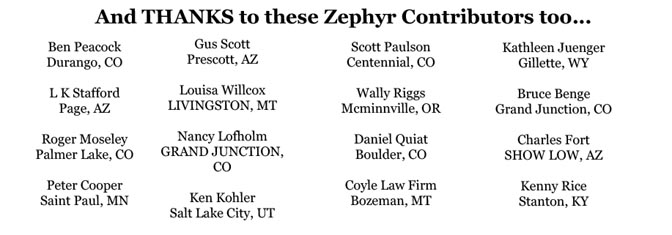
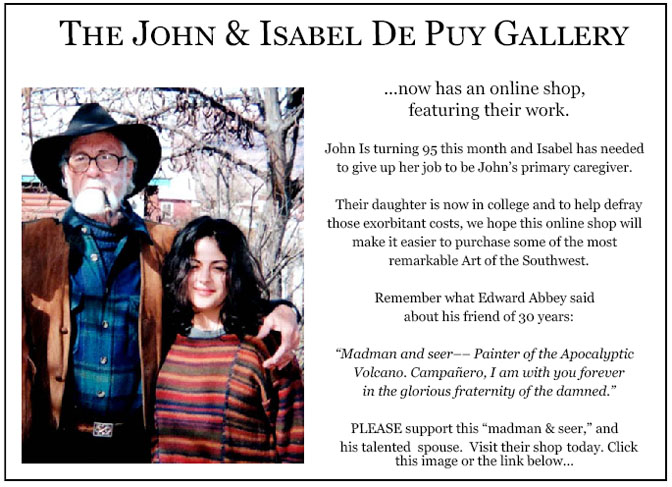
Thanks to them, our bills were almost completely covered.
Now I’d like to return the favor. Check out the link below and their online shop… JS
https://www.depuygallery.com/shop.html

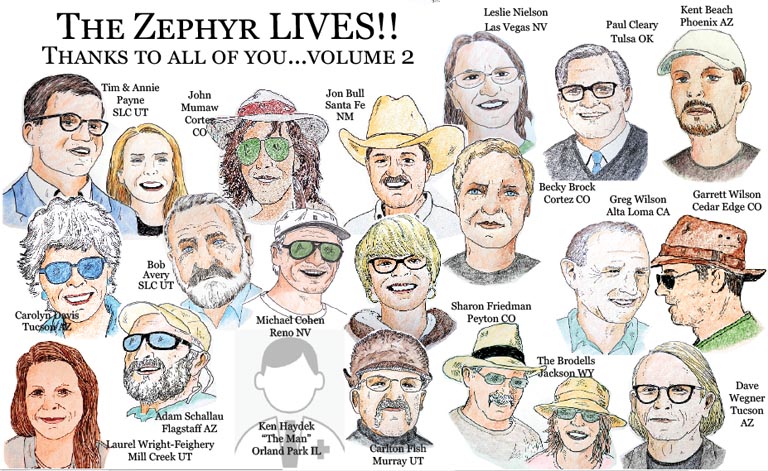
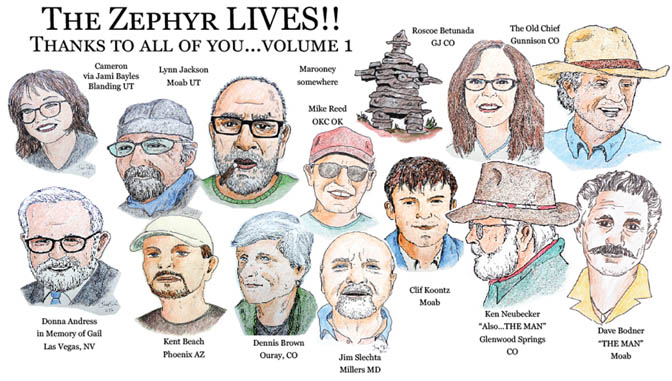
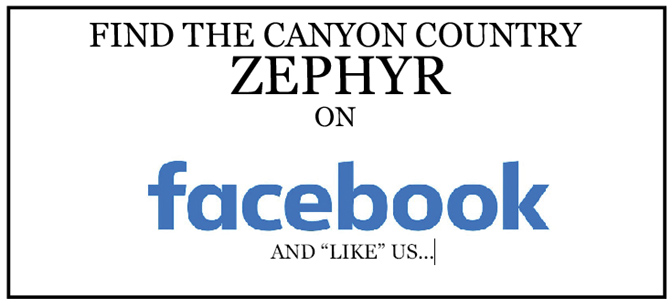
Why they can’t just
leave the site alone is beyond me, but that’s what Facebook likes to do.
ALSO NOTE: I post old photographs and stories from our 25 year old archives every day. Pictures from Herb Ringer, Edna Fridley, Charles Kreischer.. even a few old photos from my Dad. So if you want to stay caught up on our amazing historic photo collections,
be sure to “follow” us on Facebook…Thanks…Jim
https://www.facebook.com/FansoftheCanyonCountryZephyr/

THESE ARE THE ZEPHYR BLUE MOON EXTRA’S TOP 10 POSTS FOR 2022, THOUGH I AM PROUD OF ALL THE 43 “EXTRAS” I HAVE POSTED SINCE MARCH 14, COMING JUST THREE MONTHS AFTER MY SUDDEN DIVORCE & I PROCLAIMED ‘THE ZEPHYR’ STONE DEAD AFTER 33 YEARS. SOMEHOW I CAME BACK WITH THIS NEW FORMAT. THE BLUE MOON EXTRA SEEMS TO BE DOING WELL. MY SPECIAL THANKS TO SAN JUAN COUNTY MAGICIAN, RICKY RICHARDSON WHO SOMEHOW MANAGED TO EVEN TEACH THIS OLD DOG SOME NEW TRICKS WHEN IN COMES TO THE PRODUCTION AND DISTRIBUTION OF DIGITAL PUBLICATIONS.
TO A HAPPIER , MORE PRODUCTIVE…AND MOST OF ALL … A TRANQUIL 2023.
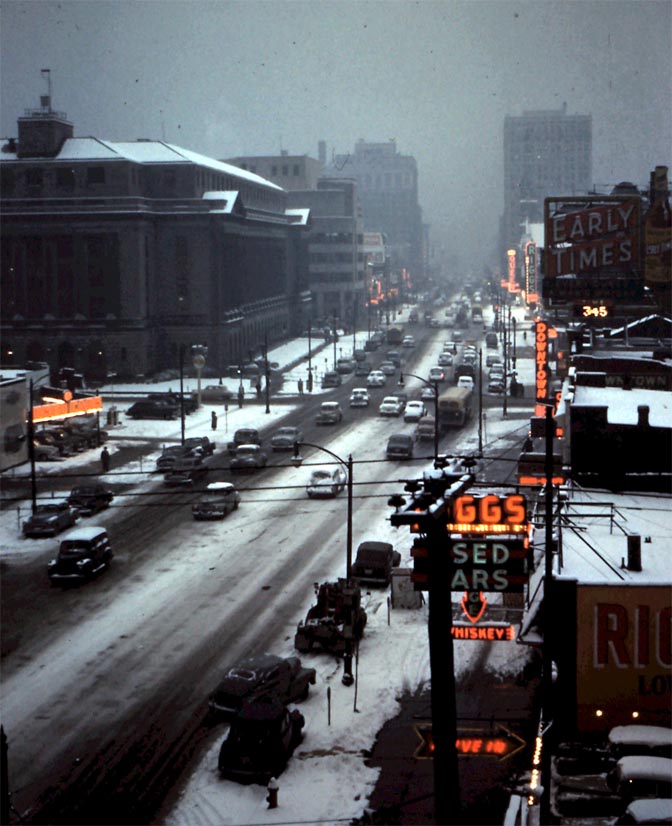
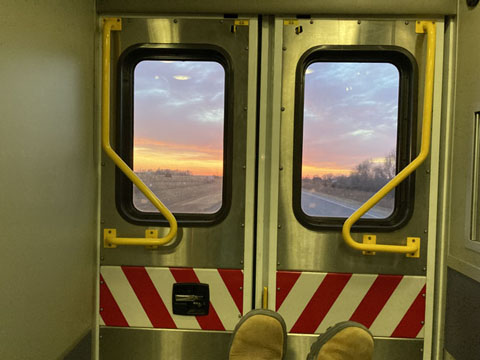
(My Recent Encounter with the Mental Health Industry) ZX#20 https://www.canyoncountryzephyr.com/2022/08/07/grief-meets-orwell-the-cuckoos-nest-by-jim-stiles-my-recent-encounter-with-the-mental-health-industry-zx20/
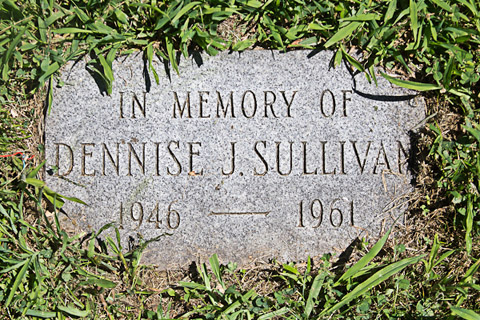
by Jim Stiles (ZX#8)
https://www.canyoncountryzephyr.com/2022/05/15/60-years-later-still-searching-for-dennise-sullivan-by-jim-stiles-zx8/
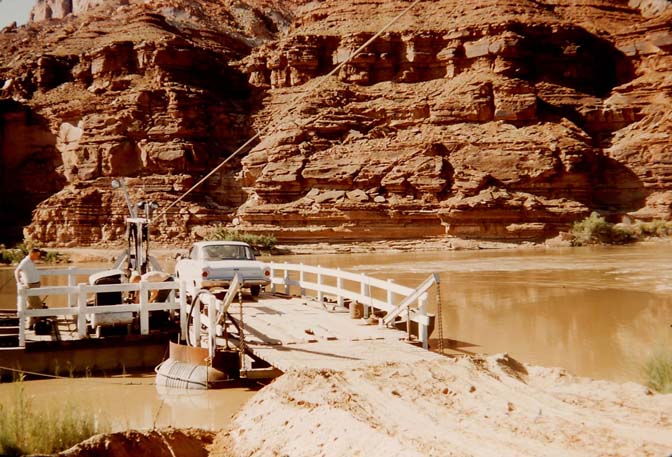
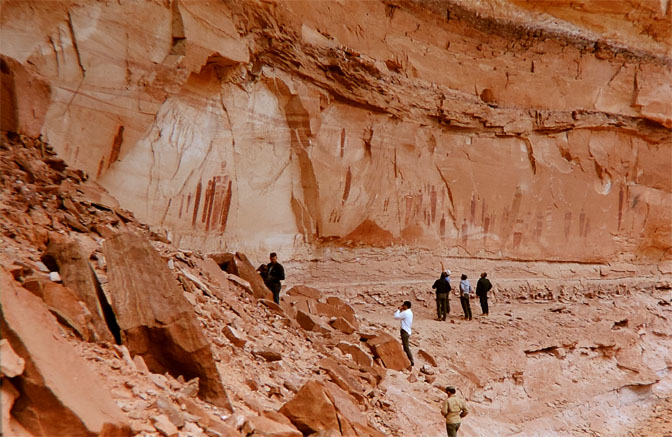
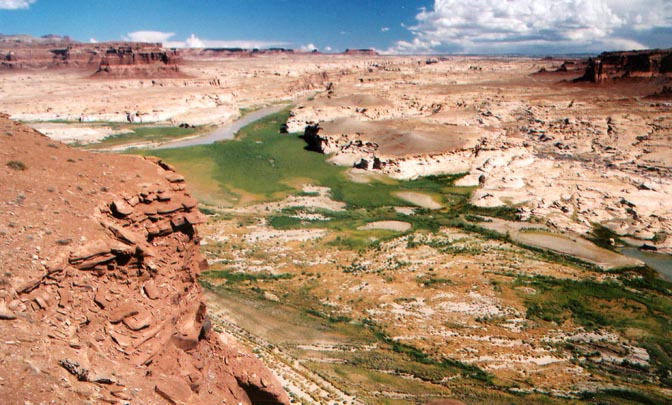
The View for the Past 51 Years w/Jim Stiles (ZX#30) https://www.canyoncountryzephyr.com/2022/10/09/glen-canyon-hite-overlook-the-view-for-the-past-51-years-w-jim-stiles-zx30/
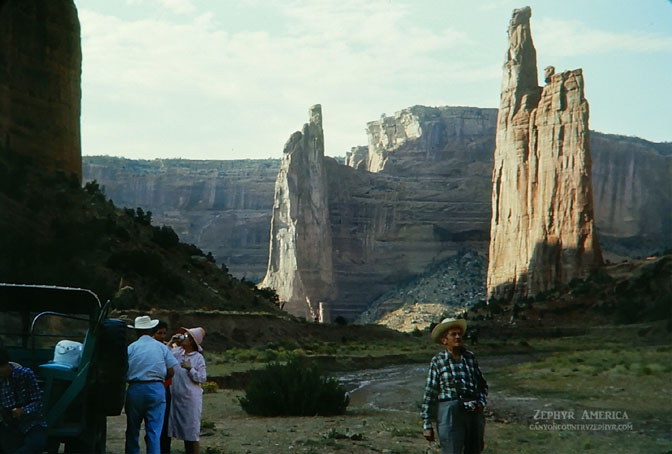
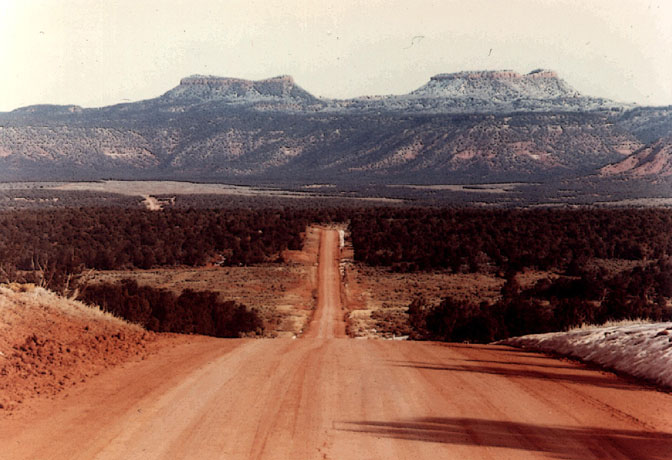
https://www.canyoncountryzephyr.com/2022/07/10/ut-hwy-95-the-road-to-glen-canyon-hite-ferry-w-edna-fridley-charles-kreischer-1959-62-zx16/
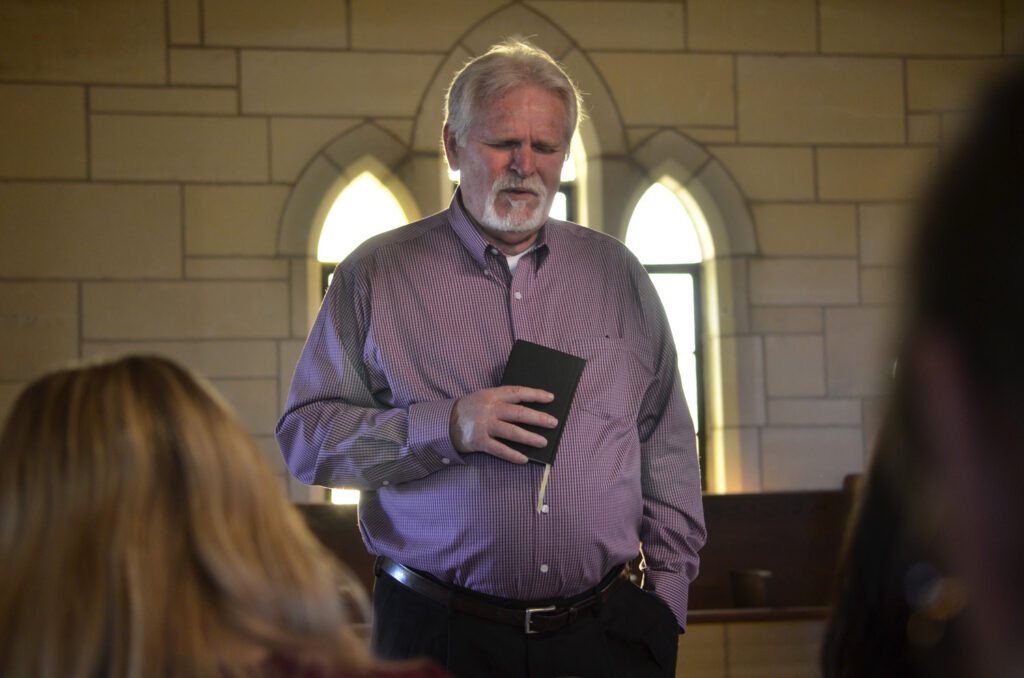
https://www.canyoncountryzephyr.com/2022/12/04/pastor-don-beats-the-devil-my-favorite-moab-preacher-jim-stiles-zx38/
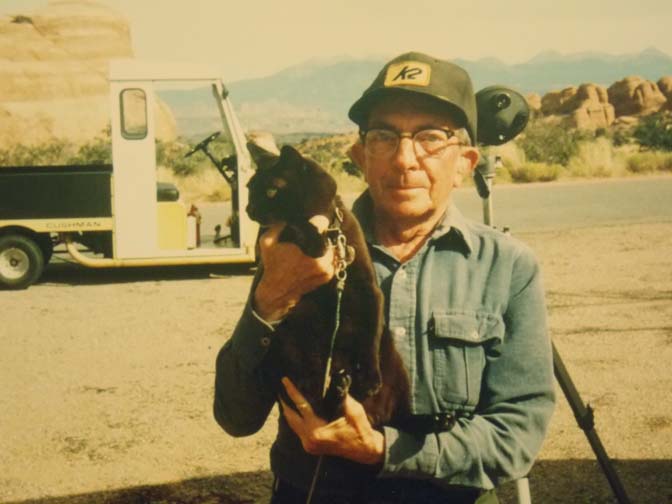
https://www.canyoncountryzephyr.com/2022/12/11/i-longed-for-the-western-life-herb-ringers-great-adventure-jim-stiles-zx39/

go to our home page and be sure to use the search bar.
https://www.canyoncountryzephyr.com/

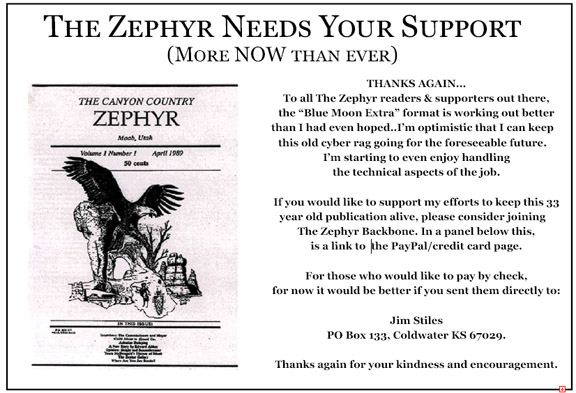
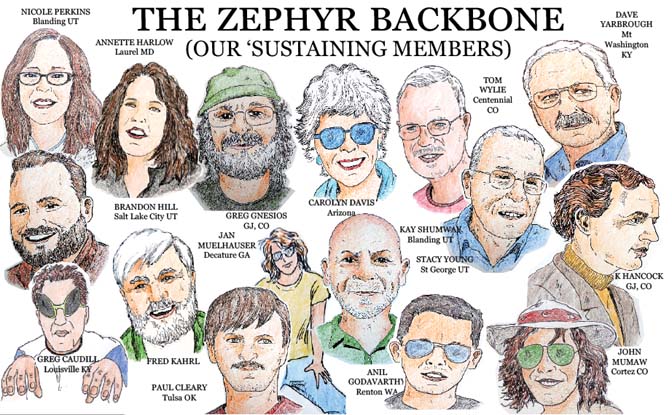
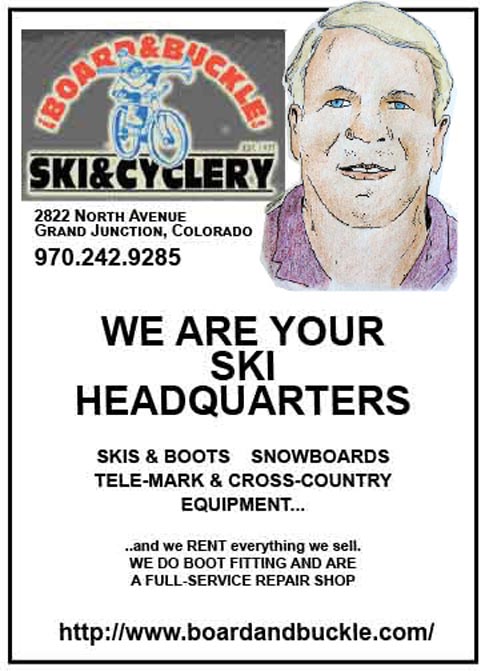
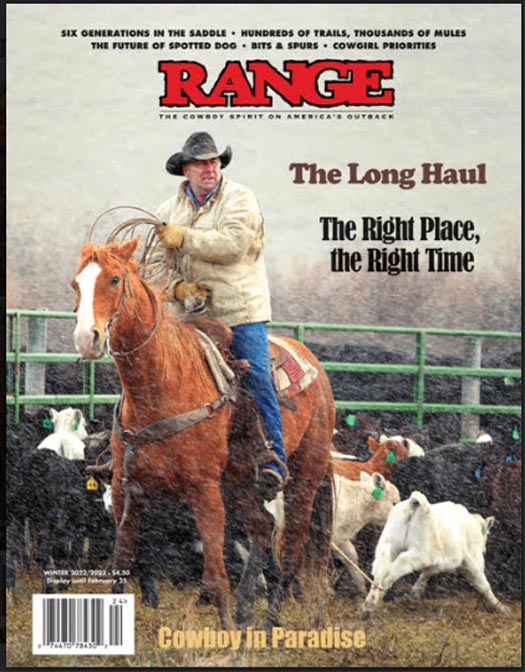
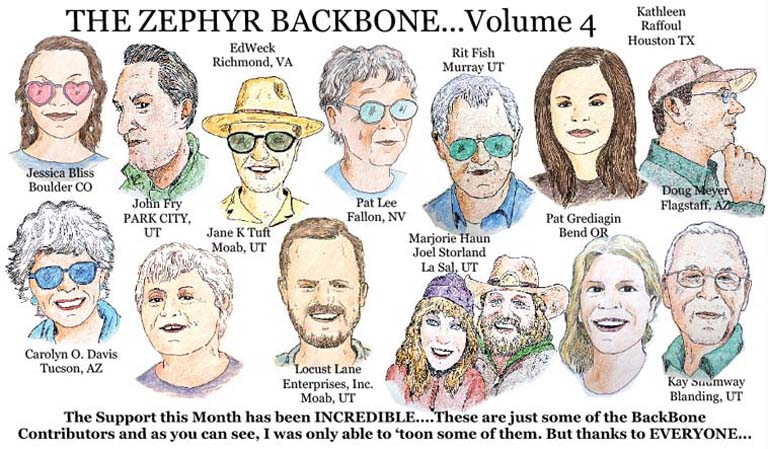
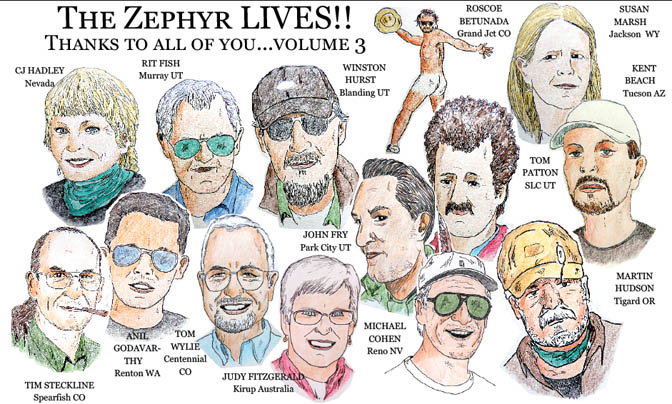

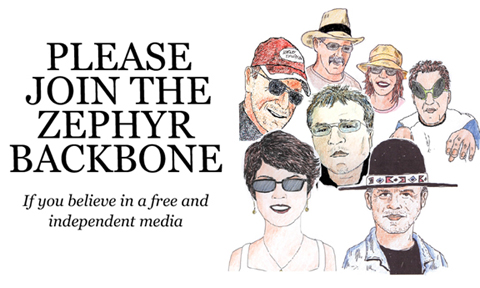
Friends of ours Toni and Ray Brown from Las Vegas, built a “cabin” almost in the spot where that young handsome feller stood looking at those gorgeous Tetons. They built it themselves and Toni could lift timbers as well as Ray. We spent a weekend with them and were blown away by the entire side of the house toward the Tetons being glass windows! We made frequent visits to Jackson Hole then, staying at a little RV Park just West of town, attending Babe Humphrey and his sons who ran a ranch, served Western dinners,played and sang and played guitar. You stood in line for the dinner (well worth it!) and one of Babe’s favorite sayings was “can’ t find an empty pocket to hang onto yer silverware? Put it in the guy’s back pocket ahead of you in line——but watch where he goes!” A little strange aside: babe and his wife are residents here at Las Ventanas! She just recently died and her funeral was celebrated here! Residents were all talking about the incoming gang of cowboys with bandanas and cowboy hats! Babe’s group also had shows here in Las Vegas and we never missed a one!
As always, a good read Jim. One thing, multiple links called out in the text aren’t actually links.
I moved to Jackson ( we didn’t call it Jackson Hole ) from Moab in 1960. I went to kindergarten and then a couple weeks of 1st grade there, before moving back to Moab for the next 8 years.
I’ll always regard Jackson with reverence. Lot’s of good memories, including watching Clover the Killer get gunned down every summer night!
Nice article, Jim!!
Jim..
Thanks for the obituary. Ive watched with sadness, the change in the past 30 years in the Tetons. The post pandemic has been the most radical during that time, even eclipsing the greed of the early 2000’s.
Still praying for the Big Crash so some of the last remaining open spaces will be spared.
Keep up the good fight.
Jackson, Sedona, Moab….all once quaint little western villages, now lost forever. At least I had an opportunity to experience these places before the ax of affluence fell.
Another great read about the inexorable slide of small town rural areas becoming playgrounds for the wealthy and the changes that occur as a result.
The story of Jackson is the story of Moab, Telluride, Durango, and everywhere in the west that has wide open spaces and great scenery. You can even see it happening in little Bluff Utah.
Phoenix Arizona used to be a small manageable city when I moved to Arizona in 1970. You could smell orange blossoms in the heart of downtown and the surrounding towns of Mesa, Tempe, Scottsdale, and Gilbert were separated from Phoenix by farms, ranches, and desert. Phoenix now covers an area incorporating all of those smaller towns and is now the fourth or fifth largest metro area and a megalopolis of the first order. In northern Az, we call it El Lay East.
It’s happening everywhere in the west but also in other rural areas around the country. There are now too many people and the wealthy can afford to move to the “country”, wherever it may be as an escape.
Seems like every other story confirms that I’ve run into you without knowing it… you probably filled the tank on my parents’ Ford Country Squire while working in Jackson. I probably got to see Clover killed in front of the elk antlers there, too, although I was too young to know who that bad man was. I think “the West” will always retain some element of what it “is”–as long as there’s a quiet spot in the woods or the desert on a day when there’s nobody else around, you’ll find yourself out West. Just don’t spend too much time in town!
Sadly, every lovely place carries the seeds of its own destruction. Look at Southern California, once close to an earthly paradise. Snowy mountains and oranges you can pick off the trees! Lovely climate! Sunny beaches! And now…….I doubt if Akron, Ohio or Gary, Indiana, or East Saint Louis, Illinois or Flint, Michigan, or Gillette, Wyoming (sorry, Gillette) ……. have a “billionaire problem”.
Lots of memories here. I moved to Jackson in 1973, and like many working locals, had to hold down two or three jobs to be able to rent an apartment with numerous roommates. I was there 42 years, so a lot of the people and the places you saw are familiar, as are the changes you describe.
The first few years I was there I could not imagine ever leaving. By the time I moved, it had become so upscale urban that I couldn’t wait to get out of there. It’s so sad to watch Moab go down the same road that Jackson did decades ago, especially with the transient room tax and its overemphasis on marketing.
Hi Colleen…you may not remember this, but you and DJ developed my very first rolls of 35mm film when I arrived in Jackson in August 1975…you may be some of the first people I met that trip… Longtime ago…
I have watched and been a part of the changes in Jackson’s Hole (named after notorious horse thief,Teton Jackson) for half a century and I decry most of them but what I came here for is still here. I can go across the street from the 100 year old cabin that we have lived in for over 40 years and get on the trail. It’s a couple weeks walk to next pavement in West Yellowstone, Montana, crossing one dirt road on the way. Walk up Cache Creek out of Jackson and it’s weeks to an asphalt road in Dubois, Lander or South Pass. There are people out there but no particular reason to actually see them with judicious route choices. In the same 5 decades I have watched the Front Range, Bozeman and Moab, to name very few, become true nightmares. I think about them when I ride my bicycle off the porch to catch an elk or trout. When folks say it’s getting too crazy here and they are leaving, I have to wonder how often they get out into the bush. The difference between the early 1970s and the 1920s or 2020s are about the same orders of magnitude. Still, we escape somewhere “West of Blanding and South of Hanksville” every spring to get perspective and real appreciation for where we live as retired dirtbags.
I’m not really a fan of ‘progress’. To me, ‘progress’ implies destruction of the natural world, in one form or another.
There is no answer: the human race is on a mission to copulate itself back to the Stone Age and to take as many other species as is possible with it.
Walt had FIVE kids; his grandparents had FIFTEEN. Jesus wept.
On lighter note: it’s nice to see Terry, the“Fifty Percenter”, riding a BSA, sans helmet, with those crazy ape hanger bars and, of course, the MGB struggling in its unnatural habitat.
The BSA was built 100 miles from here; the MG, 50 miles. These products were from an era when Britain made half-baked vehicles and spent fortunes marketing them.
Great read, Stiles – if that’s not being too ‘ad hominem’.
Thanks for another wonderful story!!! I was in Jackson Hole 6/2019 with the Zane Grey’s West Society. It is a beautiful place in spite of all the development. Nearby Yellowstone, Bryce Canyon, and Teton NP’s are also so crowded, it is pathetic. Texas is now also a victim of this same awful disease. The beautiful hill country, the Big Bend country, and the whole state is being ruined by this same tragic greed and overpopulation. Crowding is unbearable. Very sad situation.
Well, that was a lot more engaging than last weeks D.C. party games…
“Ding!” The thought of that sound sure evokes a lot of memories. The manager of the Chevron Station in Los Alamos ca.1990 was part of an older bunch that hazed me some in seventh grade. I still think I should have hit him up for a job before returning to Utah. Ya never know. The station had an excellent view;-)
Fall of 1973 & I was starting at a small Mormon college in Rexburg Idaho. For some strange reason I was assigned to be a “Family Group Father”. The first Monday, a couple of buds from LA invited me on a drive through Yellowstone and Jackson Hole. It was an epic drive with great scenery and a trio of friendly young ladies. Got back to campus about the same time that the first Family Group meeting ended. The Bishop tried to look serious and told me, “Well it’s okay this time. Just don’t make a habit of it.” Never been back to see Yellowstone or the Tetons. I should have wandered off one day a week, with several weekend trips.
Never bonded with the land, never went back.
For thirty+ years, I’ve watched the infill, trophy homes, and extreme mansions right here in Happy Valley (Utah County, Ut.). Throw in high-density and disgusting boxes. My life has always been bound to the open spaces and simple miracles. Sometimes there’s nothing left for them rich weasels but to ‘fart in their general direction for baby Jesus’…
Sometimes I feel like your damn shadow. I also first laid eyes on the Tetons in ’67, when I was 11. Mom & dad hauled us 4 kids around the west in a Pontiac towing a 20′ trailer, 9600 miles in 29 days, from south Louisiana to the west coast, up to Vancouver, across BC to Calgary, down the Rockies, just missing Moab by a few miles on the way home. Then again in ’68 with bayou bred boy scouts headed to Jamboree near Coeur D’Alene, and again in ’72 on another month long family camping trip up & down the Rockies. In the ’80s when I was living on the Salmon in central Idaho I occasionally went to Jackson for kicks, but even then it seemed crowded & tame compared to Challis. I finally got to live a childhood dream in ’01 when I got a gig as river ranger on the Snake in GTNP. Raised my kid there, living in Moran, up Pacific Cr., in Moose, and lastly in Alta, on the backside of the Tetons. Saw a lot of changes over the years, and it’s heart-breaking to see these places treated like a trophy wife, but to paraphrase a buddy of yours, it’s “the most beautiful place on earth. There were many such places.”
Hello Jim
I sure enjoyed reading your history and your story of Jackson. In ’59 my dad took off a week early from his seasonal job at Glacier and mom and he and I went south. Visited Jackson, but I don’t remember the killer. What I do remember is camping in Yellowstone and then as we moved on we read that the next day was the Yellowstone earthquake. We went on south to Petrified forest and the canyon before heading back home to Wisconsin. Good times when you could just pull into a campground and find a spot. I also think of that spot at Arches where we get a nice view, you and me, and it has no name, so no one is there! Thanks, Jim
Enjoyed the variety of stories. Over population, urban spread, water shortages, higher electrical prices. Local power companies raising prices as the gummint pushes electric vehicles! Our Nevada area is much like the area around Jackson Hole. One Strip facility offers 3 days for $11,000 during the F! race here in November. Will all this kill the goose who laid the golden egg? The County plans on buying more land from BLM because “we need more housing” as Lake Mead has the widest white ring around it, threatening even more danger of a water shortage. I offered to back a candidate for office if that candidate would be strong enough to say “NO” to future building. No acceptance. Progress is not always wonderful.
I lived in Jackson from 1972 until (I thought it was ruined) 1978. I worked many jobs from the Elkhorn Cafe, RJ Bar, Clarks Construction, and many other jobs. Just bringing up these names because I am sure you will remember them. I also lived in Queen Creek, AZ in the mid 80s to 1995 when it was a little dirt town way outside of Phoenix. It had a gas station, a restaurant and and P.O. and now it is a huge fancy neighborhood. I have lived in so many places where the growth is just so sad and destructive. I now live in a small town in Montana. When I first went to Bozeman, it was a Main Street with Mom and Pop stores and now it is just hustle and bustle with the rich and famous and the homeless.
Jackson was so fun and what I loved, “cowboy.” I have been back once or twice because of company wanting to go….but we don’t stay long. Such a shame how this whole country is going.